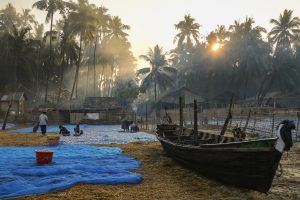Myanmar’s Rakhine State faces possible famine due to plummeting incomes and disruptions to employment and agricultural production linked to the ongoing conflict in the state, the United Nations has warned.
In a report released yesterday, the U.N. Development Programme said that Rakhine State’s economy has effectively “stopped functioning,” as rice cultivation has fallen and military-imposed trade restrictions have led to severe food shortages and hyperinflation.
“Rakhine stands on the precipice of an unprecedented disaster,” the UNDP stated, projecting “famine conditions by mid-2025” if the current situation persists, without substantial humanitarian assistance.
Rakhine State has been in a state of conflict since November 2023, when the Arakan Army (AA), an ethnic Rakhine armed group, attacked Myanmar army positions, breaking a loose ceasefire established shortly prior to the 2021 coup. Since then, the AA has established its effective control over most of the northern part of the state – but fighting continues to rage, as the Myanmar army tries to prevent the state from slipping beyond its control.
In addition to the displacement of tens of thousands of residents, the conflict has taken a significant toll on the region’s economy. The report noted the pernicious effects of a “chain of interlinked developments,” such as restrictions on goods entering the state across international and domestic borders, hyperinflation, collapsing domestic food production, and a lack of essential services. As a result, “an already highly vulnerable population may be on the brink of collapse in the coming months.”
According to the UNDP, the conflict has prompted the military to seal Rakhine off from both Bangladesh, with which it shares a border, and four neighboring regions: Chin State, Magwe Region, Bago Region, and Ayeyarwady Region. As a result, there are now just two trade routes bringing essential supplies into Rakhine, down from 8-10 in October of last year.
Concurrently, internal rice production in Rakhine State is “plummeting” due to “a lack of seeds, fertilizers, severe weather conditions,” and a “steep rise” in the number of displaced people in Rakhine. As a result, the UNDP predicts that only around 97,000 tons of rice are set to be cultivated in Rakhine in 2024, down from 282,000 tons last year. This will “only cover 20 percent of its needs by March-April 2025,” it warned, leaving over 2 million people at risk of starvation.”
Both of these factors, as well as the collapse of the construction sector, one of the state’s major sources of employment, which is also shutting down as imports of cement from neighboring countries have come to a halt, have eaten into the incomes of many residents of Rakhine State. UNDP’s research suggests that more than half of households in Rakhine, or about 1.4 million people, will have seen their monthly income plunge from 66,600 kyat ($31.70) to about 46,620 kyat ($22.21) over the past year, as the fighting has intensified.
At the same time, shortages have driven up the price of basic goods by in some cases hundreds of percent. By July of this year, for instance, the price of rice had risen by 944 percent in Maungdaw, 487 percent in Toungup, 411 in Myebon, and 404 percent in Sittwe since the February 2021 coup, according to price monitoring data from the U.N. World Food Programme. The report noted similar increases in the cost of cooking oil and transport.
The UNDP says that particular risks now face members of the long-persecuted Rohingya Muslim minority, which have been victimized in the past by both ethnic Rakhine nationalists and the Myanmar military, and the 511,000 people that the U.N. estimates are now displaced in Rakhine State.
The UNDP report makes for grim reading, but it offers a reminder of the extent of the humanitarian emergency now unfolding in western Myanmar, which has faded from the international headlines even as it has grown more acute.
“Without urgent action, 95 percent of the population will regress into survival mode, left to fend for themselves amid a drastic reduction in domestic production, skyrocketing prices, widespread unemployment, and heightened insecurity,” the UNDP report stated. “With trade routes closed and severe restrictions on aid, Rakhine risks becoming a fully isolated zone of deep human suffering.”

































